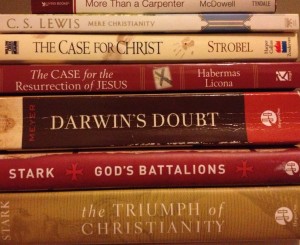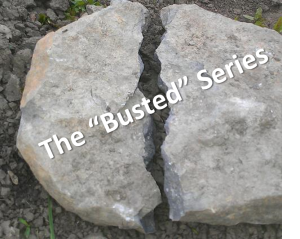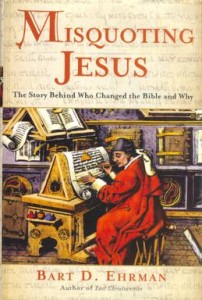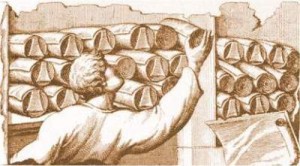The Christian church teaches that the four canonical gospels—the New Testament accounts of Jesus’ birth, teachings, death, and resurrection—were written by eyewitnesses to the events they describe, or by persons with access to eyewitness testimony. Church history tells us that the gospels of John and Matthew, for example, were written by two of Jesus’ original twelve disciples. The Gospel According to Mark was written, we are told, by a follower of Peter, another disciple. Finally, The Gospel According to Luke was apparently written by a companion of Paul who interviewed disciples and other eyewitnesses. As a result, the church argues that these documents reflect direct, eyewitness testimony, and are reliable historical documents. Continue reading
Author Archives: Craig Dunkley
Busted (7): The Book of Acts Agrees With the Skeptics!?
Many anti-Christian commentators argue that the gospels and other New Testament documents, contrary to Church teaching, could not have been written by direct eyewitnesses to the events they describe. This is because, they argue, Jesus and his disciples were just simple, illiterate, Aramaic-speaking peasants who probably couldn’t write their own names, let alone a Greek gospel account. The argument is weak, and we have countered it in other articles (here and here).
However, there is another angle to this argument that we should address. Let’s allow Matthew Ferguson, a Ph.D. hopeful—and activist atheist—from UC-Irvine to lay it out for us: Continue reading
Busted (6): The Massacre of the Innocents…Did It Happen?
The second chapter of Matthew relates a story found in no other gospel, known as the Massacre of the Innocents. In this story, King Herod (the king of Judea and client of Rome) orders the killing of all boys less than two years of age in Bethlehem. Herod takes this “scorched earth” approach in a desperate attempt to find and kill the recently-born Jesus, who he believes will grow to become a threat to his throne.
Critics have long alleged that this story never happened, saying that the gospel author just made it up to create a fulfillment of prophecy. Continue reading
Resources on New Testament History & Apologetics
 Earlier this week, I promised a friend that I would provide for him a list of resources to aid in his studies about the New Testament, how it developed, how we know it’s true, and how we can combat the false information about Christianity that seems to proliferate both on- and off-line. Well, this post makes good on that promise. It’s an expanded version of a list that I posted some time ago.
Earlier this week, I promised a friend that I would provide for him a list of resources to aid in his studies about the New Testament, how it developed, how we know it’s true, and how we can combat the false information about Christianity that seems to proliferate both on- and off-line. Well, this post makes good on that promise. It’s an expanded version of a list that I posted some time ago.
Obviously, this list is far from exhaustive, but it does provide a wide range of excellent resources. Hopefully, he—and you—will find it useful. Continue reading
Busted (5): Did Luke Exhibit “Geographical Ineptitude?”
 Continuing with our “Busted” series, in this article we tackle the charge that Luke is an unreliable historian because he demonstrates in Luke 17:11 that he doesn’t even know basic geography. Here is the “offending” passage:
Continuing with our “Busted” series, in this article we tackle the charge that Luke is an unreliable historian because he demonstrates in Luke 17:11 that he doesn’t even know basic geography. Here is the “offending” passage:
Now on his way to Jerusalem, Jesus traveled along the border between Samaria and Galilee. (Luke 17:11, NIV) Continue reading
Busted (4): Did Luke Screw Up Pilate’s Job Title?
 In a previous article, we explored how critics falsely accuse Luke of gross inaccuracy in Luke 3:1. Here, we return to the same verse to explore another alleged mistake. Let’s review the relevant part of the passage, from the English Standard Version:
In a previous article, we explored how critics falsely accuse Luke of gross inaccuracy in Luke 3:1. Here, we return to the same verse to explore another alleged mistake. Let’s review the relevant part of the passage, from the English Standard Version:
In the fifteenth year of the reign of Tiberius Caesar, Pontius Pilate being governor of Judea,…
Some critics have pointed out that Luke refers to Pontius Pilate as the governor or “hegemon” (ἡγεμών) of Judea, rather than by his actual title, which was prefect (νομάρχης). If, the critics say, Luke was wrong about something that simple, then he surely was wrong about other things, too. Continue reading
Busted (3): Did Luke Get a Date Wrong by 60 Years?
 It seems that whenever one of the gospel accounts disagrees with that of a non-Christian historian, skeptical scholars assume it’s the gospel-writer who got it wrong. That’s a dangerous thing to assume.
It seems that whenever one of the gospel accounts disagrees with that of a non-Christian historian, skeptical scholars assume it’s the gospel-writer who got it wrong. That’s a dangerous thing to assume.
Luke 3:1 is a passage that many critics have used to “prove” Luke’s incompetence as an historian. Here’s the passage (ESV): Continue reading
Busted (2): Was Luke Wrong About the Jewish High Priest(s)?
 In this article, we tackle an alleged error in the Gospel of Luke that some critics use to paint Luke as an unreliable historian. Let’s take a look at the offending verse, Luke 3:2 (English Standard Version): “…during the high priesthood of Annas and Caiaphas, the word of God came to John the son of Zechariah in the wilderness.”
In this article, we tackle an alleged error in the Gospel of Luke that some critics use to paint Luke as an unreliable historian. Let’s take a look at the offending verse, Luke 3:2 (English Standard Version): “…during the high priesthood of Annas and Caiaphas, the word of God came to John the son of Zechariah in the wilderness.”
So, what is the alleged mistake? Continue reading
Busted (1): Synagogues Didn’t Exist In Jesus’ Time
Introducing the “Busted” Series
 The gospels, the book of Acts, and other New Testament documents have proven their worth as historically accurate documents over the centuries. Nevertheless, anti-Christian scholars persist in their efforts to paint the gospel writers as liars at worst and careless historians at best. Continue reading
The gospels, the book of Acts, and other New Testament documents have proven their worth as historically accurate documents over the centuries. Nevertheless, anti-Christian scholars persist in their efforts to paint the gospel writers as liars at worst and careless historians at best. Continue reading
Ben Witherington Critiques Bart Ehrman’s Book, Misquoting Jesus
 This is the last in our series of posts sharing Ben Witherington’s critiques of Bart Ehrman’s work. Today, we share a critique of Misquoting Jesus: The Story of Who Changed the Bible and Why.
This is the last in our series of posts sharing Ben Witherington’s critiques of Bart Ehrman’s work. Today, we share a critique of Misquoting Jesus: The Story of Who Changed the Bible and Why.
I have to ask the question: Does Bart Ehrman have any original thoughts? This book, like his others, contains many criticisms that are old, as well as busted. Misquoting Jesus asserts that belief in the divinity of Christ, as well as many other core tenets of Christianity, are basically the result of scribes altering the original texts over the centuries, either intentionally or unintentionally. Continue reading



